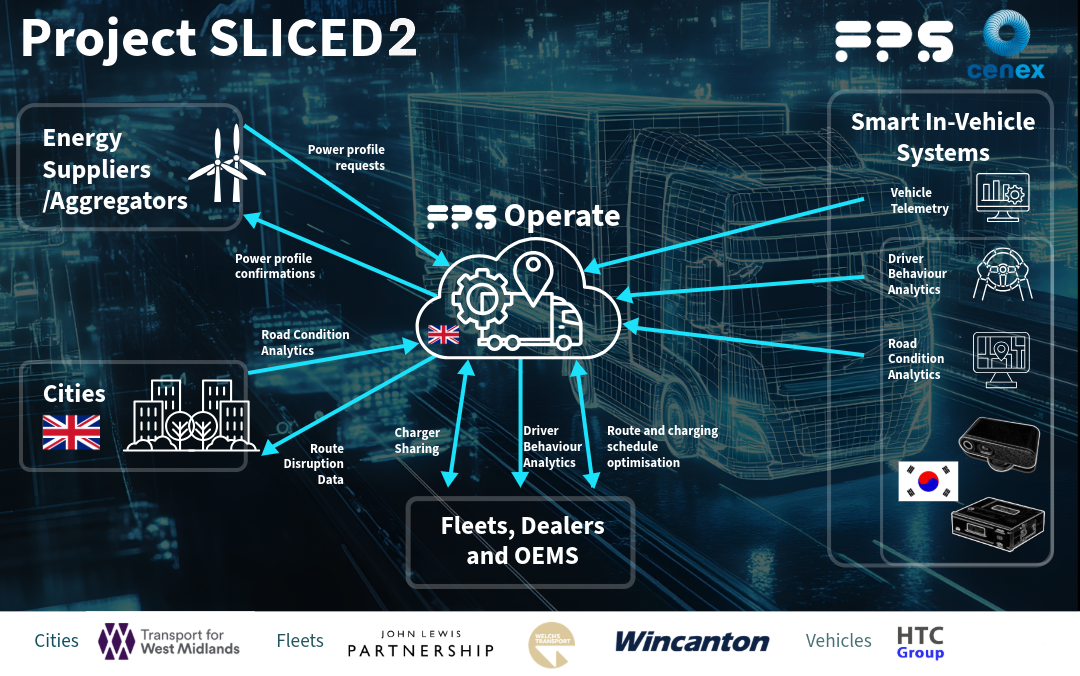
- Categories:
- News
- /
- Announcement
- /
- Press Releases
Cenex and Flexible Power Systems Launch SLICED2 Demonstration, Bringing Smart Urban Logistics Technology Concepts into Real World Use
Loughborough, UK, 30 July 2025 – Cenex and FPS are pleased to announce the launch of Project SLICED2 (Smarter Logistics through In-vehicle, City and Energy Data), a UK-South Korea collaborative demonstration project that will showcase how integrated smart city, vehicle, and energy data can improve the safety, sustainability, and efficiency of commercial fleets operating in urban environments.
Funded by Innovate UK, the SLICED2 project builds on the success of the original SLICED feasibility study, during which partners developed and validated new systems aimed at enhancing safety, sustainability, and efficiency in urban fleet operations. The first phase of SLICED, which finished in March 2025, identified the key areas in which a smart logistics demonstrator should focus: driver impairment and behaviour, road conditions, energy flexibility enabled by EVs, and leveraging smart city data (e.g. traffic flow, disruptions, large events). In this second phase, the focus shifts to demonstrating these systems in live environments, showcasing the integration of data from vehicles, smart cities, and the energy grid for everyday logistics management.
Through SLICED2, FPS will deploy an extended version of its Operate platform, incorporating driver and road condition monitoring devices developed in South Korea, along with real-time data from cities and the energy grid. Cenex will lead the project’s demonstrations and evaluations in the UK, forming a “Voice of the Customer” group collaborating with fleets such as John Lewis Partnership, Welch Group, and a broader stakeholder group that includes HTC and Wincanton; and with transport authorities such as Transport for West Midlands, with others to be contacted too.
The technology being tested not only promotes safer and more efficient vehicle operations in the context of large-scale EV adoption but also establishes a framework for data sharing between cities and fleets. This can lead to benefits such as cleaner air, reduced congestion, and lower logistics costs.
South Korean partners Thallos, Innoca, KETI, and KAATA will continue to provide advanced in-vehicle safety systems and technical support. Discussions are also ongoing to explore a cross-border joint venture structure that could facilitate the co-commercialisation of these solutions in both countries and beyond.
Key outcomes of Project SLICED2 will include:
- A smart logistics data platform validated in the real world to improve driver safety and sustainability of logistics operations
- Field validation of devices for monitoring driver condition, driving style and road condition
- A deeper understanding of how fleets and cities can best co-operate to benefit urban communities
- A public report describing the demonstration study methodology and the evaluation of the qualitative and quantitative data collected during the demonstration
The project will run until March 2027, with the demonstration planned to begin in Q1, 2026. In preparation for the trials programme, efforts are focused on initiating co-operation between fleets and cities, developing the South Korean in-vehicle systems, and expanding the FPS Operate platform to integrate several additional data streams that will be generated during the project.
Victor Lejona, Modelling & Analysis Team Leader, Cenex, said:
“SLICED was an eye-opening feasibility study that told us there is more to do regarding data integration between fleets, cities and the energy grid. We are very excited to begin the demonstration in the real world to gain a better understanding of the opportunities and barriers of the system in different environments, with different vehicle types and different fleet operations.”
Michael Ayres, Managing Director, Flexible Power Systems, said:
“We’re delighted to be continuing the co-operation with our consortium partners. Logistics fleets are part of a complex supply chain ecosystem on which we all rely. Better integration of city and energy network intelligence into fleet decision making will improve the efficiency of these operations as EV adoption gathers pace. Moreover, this connection also has the potential to significantly improve quality of life in the communities in which these fleets operate.”
Jackie Hewson, Alternative Fuels Implementation Manager, John Lewis Partnership said:
“As we continue the electrification of our fleet the importance of trialling new technologies to enhance operations in urban environments has taken on even greater importance. By adopting the FPS Operate Platform we have been able to integrate data from our vehicles and leverage greater operational efficiency, improve partner driving style & behaviours and drive forward our sustainability targets.”
Jamie Sands, Head of Solutions, Welch Group, said:
“For us, SLICED isn’t just about collecting more data. It’s about using the right data in the right way to drive real operational change. When fleets, cities, and the energy grid all start speaking the same language, we can make smarter decisions, reduce waste, and improve safety. That’s not just innovation for innovation’s sake. It’s progress you can actually see on the road.”